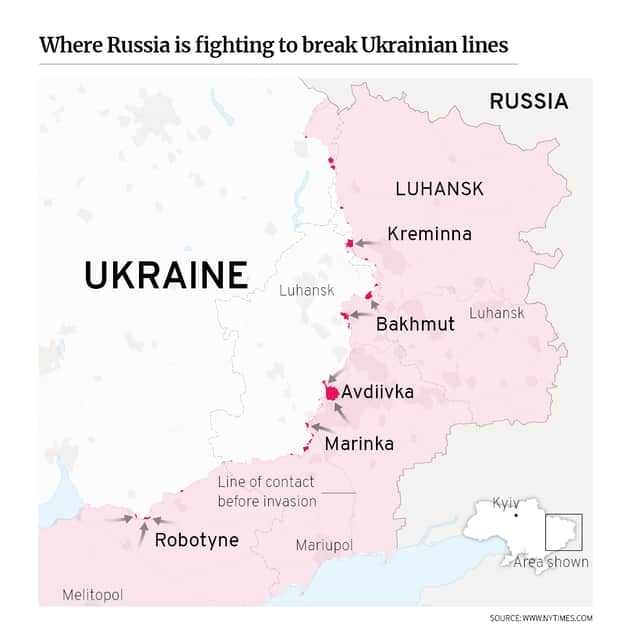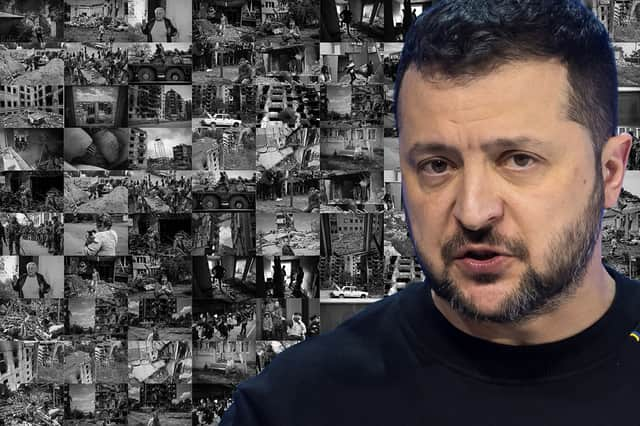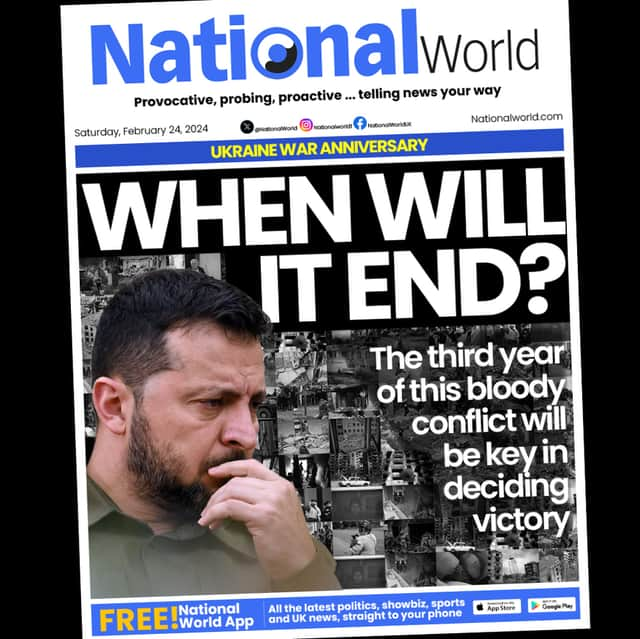Ukraine-Russia war map: latest state of play in Putin’s invasion, can Zelenskyy still win?
and live on Freeview channel 276
The future of Ukraine is very much in the balance as the conflict with Russia enters its third year.
Today (24 February), marks the second anniversary of Vladimir Putin’s murderous invasion, which has left hundreds of thousands of people dead or injured, even more displaced and turned thriving towns and cities into blackened rubble. But as we enter the third year of fighting, the war is at a key juncture.
Advertisement
Hide AdAdvertisement
Hide AdRussia has just started to make its first gains for a long time, taking the city of Avdiivka near Donetsk (which you can see on the map below), after Ukraine’s counter offensive last summer failed to retake much ground. And there are several global events that could have a big impact on the war.
Firstly, President Joe Biden’s near £50 million ($60mn) military aid package is currently being blocked by Republicans in Congress. This will supply much needed weaponry to the Ukrainian front line, which is running low on ammunition and other key supplies.
Secondly, if Donald Trump is elected President for a second term in November, this would hand all the initiative towards Putin. Trump has consistently opposed sending additional funds to Ukraine and recently said he would encourage Russia to attack Nato allies who had not committed to the 2% of GDP defence spending.
As you can see, this year is likely to be key in deciding the victor of the overall conflict, but what is the state of play now and can Ukraine still win? Here’s everything you need to know.


Ukraine-Russia war map and state of play
Advertisement
Hide AdAdvertisement
Hide AdThe Ukraine-Russia war is currently in its third phase, according to Eliot Cohen, a former advisor to the State Department in the US. The first phase was the initial Russian invasion in which they nearly reached Kyiv, while the second part was Ukraine’s counter offensive which moved the front to the east of the country (as you can see on the map).
Now the conflict is in its third phase of “positional warfare”, Cohen explained. He told the Ukraine in Balance talk from the Center for Strategic and International Studies (CSIC) that this “has consisted of a series of attacks and counter attacks … where the initiative shifts back and forth but where there’s a lot of adaptation and innovation and change”.
In this period, Russia took the city of Bakhmut last year, in what has been described as the bloodiest infantry battle since the Second World War, at a huge cost of around 17,000 lives. And earlier this month Putin’s forces took the nearby city of Avdiivka, which had previously been a Ukrainian stronghold. Ukraine’s commander of troops in the south, Oleksandr Tarnavskyi, said his men had no choice but to pull back.


However, Emily Harding, a deputy director at the CSIS, explained that this was not necessarily a major victory for Russia, given the high cost of troops. “It’s hard to call it a success for anybody,” she said. “If you’ve lost 17,000 troops – and we should mention had to murder one of your pro-Kremlin bloggers [Yevgeny Prigozhin] to cover up the fact that you lost 17,000 troops – that is not a success for Putin.”
Advertisement
Hide AdAdvertisement
Hide Ad“I think that the Ukrainians and the Europeans should be pushing the fact that, yes, the Russians got Avdiivka but at what cost,” she added. “Are they going to be able to pay that cost all along that front?”
Russia currently has five points along the huge front where it’s attacking - four sections in the east and Robotyne in the south. While Moscow has suffered far more casualties than Kyiv’s forces, it can easily replenish them, while Ukraine desperately needs more ammunition and troops.
That’s why Foreign Secretary David Cameron has been so keen to push for additional support, saying US Congress should not show “the weakness displayed against Hitler” with appeasement. He said: “Right now in Congress, the American support for Ukraine is being debated, and I urge those congressmen and women to pass that bill to provide that money, to provide those weapons to Ukraine.
“They are fighting off illegal Putin aggression and they need our support. We should be standing up for freedom, standing up for the right of this country to defend itself and making sure that Putin doesn’t win.”
Advertisement
Hide AdAdvertisement
Hide AdExperts say we are likely to be locked in this phase of war for some time. Michael Kofman, a senior fellow at the Carnegie Endowment for International Peace, told a recent panel discussion that he expected Ukraine to dig in and defend the front to try and tire out Russian troops. While Putin may be waiting for a possible Trump Presidency to try and force a negotiated settlement, before launching another attack.
Eliot Cohen explained: “I think that what they would probably like to do, ultimately, is put this to a negotiated settlement which would not be permanent, which would just set them up for another offensive somewhere down the line.
“So that, in some ways, I think is the real target. You know, the centre of gravity, to use some military jargon, is public opinion and the opinion of political elites, particularly in the United States, to persuade them that, look, Ukraine just can’t win; you know, the Russians are relentless, have resources that are essentially infinite and an infinite willingness to suffer. Now, I don’t think any of those things are true, but I think that’s a large part of what the Russians want us to believe.”
The other part of the war, in which Ukraine is doing incredibly well, is at sea. Ukrainian drones have damaged five of Russia’s nine landing vessels in the Black Sea, including most recently sinking the Caesar Kunikov ship on 14 February.


Can Ukraine still win the war?
Advertisement
Hide AdAdvertisement
Hide AdDespite what Russia, Trump and Elon Musk want you to think, clearly Ukraine can still win this war. However, it is essential it gets aid from Europe and America as quickly as possible to replenish ammunition and weapons’ supplies. In particular, Volodymyr Zelenskyy has called for more fighter jets from the West to allow Ukraine to dominate the aerial battle.
Kofman says Ukraine can win with “an approach framed as hold, build and strike”. He told the Defense Priorities panel: “The focus for this year Ukrainian forces and Western efforts should be to hold … to try and exhaust Russian forces at the peak of Russian defence spending, make any gains for them incremental and quite costly.”
The CNA’s Russia Studies Program director then said Ukraine would need to mobilise more troops and military capabilities, with investment from the West. Kyiv would then “strike” in the Black Sea, Crimea and also behind Russian lines.
He added: “Maybe in the best-case scenario, Ukraine can retake the initiative next year, and in the worst-case scenario, Ukraine can still effectively hold, and Russia will not be on track to realise its war aims by 2025 or 2026."
Advertisement
Hide AdAdvertisement
Hide AdBoth Cohen and Harding think 2024 will be stuck in a holding pattern, while Ukraine defends and attempts to freshen up its troops on the front, making 2025 the decisive year. Harding says it’s essential for the US and Europe to keep supplying aid, and added that if Kyiv’s forces start to make gains and push through the line they could flip the conflict on its head.
She also said it’s important to try and get ordinary Russians to feel the impact of the war through sanctions and other measures. Currently, Russia is able to circumvent sanctions by setting up shell companies in neighbouring states for importing goods. The UK has indicated it is looking at increased measures following Alexei Navalny’s death, it’s vital that these are effective.
What's been said about the Ukraine-Russia war anniversary?
Rishi Sunak recommitted Britain to supporting Ukraine to the end. He said: "When Putin launched his illegal invasion two years ago, the free world was united in its response. We stood together behind Ukraine. And on this grim anniversary, we must renew our determination."
He added: "The UK is going further in our support. I announced last month the biggest single package of defence aid to Ukraine, taking our total support to £12 billion and signed a ten-year agreement on security cooperation – the first of its kind.
Advertisement
Hide AdAdvertisement
Hide Ad"This is the moment to show that tyranny will never triumph and to say once again that we will stand with Ukraine today and tomorrow. We are prepared to do whatever it takes, for as long as it takes, until they prevail."
While Labour leader Sir Keir Starmer said: "The resistance of the Ukrainian people has inspired and humbled the world. The UK and our allies will stand in solidarity with them until their day of victory. We will not waiver. We will not abandon them. We will not be divided in the face of tyranny or oppression. We look together to the day when Ukraine secures justice and liberty in their rightful homeland, when Ukrainians can return home and rebuild their great country, and live peacefully, freely, and proudly."
Ralph Blackburn is NationalWorld’s politics editor based in Westminster, where he gets special access to Parliament, MPs and government briefings. If you liked this article you can follow Ralph on X (Twitter) here and sign up to his free weekly newsletter Politics Uncovered, which brings you the latest analysis and gossip from Westminster every Sunday morning.
Comment Guidelines
National World encourages reader discussion on our stories. User feedback, insights and back-and-forth exchanges add a rich layer of context to reporting. Please review our Community Guidelines before commenting.
